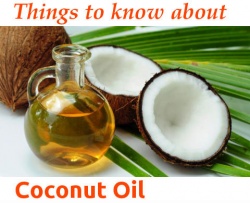Coconut Oil Benefits: When Fat is Good for You
by Dr Joseph Mercola

You’ve no doubt noticed that for about the last 60 years, the majority of health care officials and the media have been telling you saturated fats are bad for your health and lead to a host of negative consequences, including high cholesterol, obesity, heart disease and Alzheimer’s disease.
Meanwhile during this same 60 years, the American levels of heart disease, obesity, elevated serum cholesterol and Alzheimer’s have skyrocketed.
Did you know: Multiple studies on Pacific Island populations who get 30-60 per cent of their total caloric intake from fully saturated coconut oil have all shown nearly non-existent rates of cardiovascular disease? The fact is, not all saturated fats are created equal.
The operative word here is “created,” because some saturated fats occur naturally, while other fats are artificially manipulated into a saturated state through the man-made process called hydrogenation.
Hydrogenation manipulates vegetable and seed oils by adding hydrogen atoms while heating the oil, producing a rancid, thickened substance that really only benefits processed food shelf life and corporate profits – just about all experts now agree, hydrogenation does nothing good for your health.
These manipulated saturated fats are also called trans-fats — and you should avoid them like the plague. But if one form of saturated fat is bad for you, does that mean all saturated fat is bad for you?
Absolutely not!
The Tropics’ Best Kept Secret
The truth about coconut oil is obvious to anyone who has studied the health of those who live in native tropical cultures, where coconut has been a primary dietary staple for thousands of years.
Back in the 1930s, Dr Weston Price found South Pacific Islanders whose diets were high in coconut to be healthy and trim, despite high dietary fat, and heart disease was virtually non-existent. Similarly, in 1981, researchers studying two Polynesian communities for whom coconut was the primary caloric energy source found them to have excellent cardiovascular health and fitness.2 Where were all the clogged arteries and heart attacks from eating all of this “evil” saturated fat? Obviously, coconut oil was doing nothing to harm the health of these islanders
It may be surprising for you to learn that the naturally occurring saturated fat in coconut oil is actually good for you and provides a number of profound health benefits, such as:
- Improving your heart health.
- Boosting your thyroid.
- Increasing your metabolism.
- Promoting a lean body and weight loss if needed.
- Supporting your immune system.
- Coconut oil even benefits your skin when applied topically and has been found to have anti-aging, regenerative effects.
So, what are coconut oil’s secrets to success?
How Coconut Oil Works Wonders in Your Body
Nearly 50 percent of the fat in coconut oil is of a type rarely found in nature called lauric acid, a “miracle” compound because of its unique health promoting properties. Your body converts lauric acid into monolaurin, which has anti-viral, anti-bacterial and anti-protozoa properties.
Coconut oil is also nature’s richest source of medium-chain fatty acids (MCFAs), also called medium-chain triglycerides or MCTs. By contrast, most common vegetable or seed oils are comprised of long chain fatty acids (LCFAs), also known as long-chain triglycerides or LCTs. LCTs are large molecules, so they are difficult for your body to break down and are predominantly stored as fat.
But MCTs7 being smaller, are easily digested and immediately burned by your liver for energy — like carbohydrates, but without the insulin spike. MCTs actually boost your metabolism and help your body use fat for energy, as opposed to storing it, so it can actually help you become leaner.
Back in the 1940s, farmers discovered this effect accidentally when they tried using inexpensive coconut oil to fatten their livestock. It didn’t work! Instead, coconut oil made the animals lean, active and hungry.
Coconut oil has actually been shown to help optimize body weight, which can dramatically reduce your risk of developing Type 2 diabetes. Besides weight loss, boosting your metabolic rate will improve your energy, accelerate healing and improve your overall immune function.
And several studies have now shown that MCTs can enhance physical or athletic performance.
And finally, as we have already discussed, coconut oil is incredibly good for your heart. The truth is this: it is unsaturated fats that are primarily involved in heart disease and too much sugar and processed foods, not the naturally occurring saturated fats, as you have been led to believe.
Coconut Oil in Your Kitchen
Personally, I use only two oils in my food preparation.
The first, extra-virgin olive oil is the best monounsaturated fat and works great as a salad dressing. However, olive oil should not be used for cooking. Due to its chemical structure, heat makes olive oil susceptible to oxidative damage. So for cooking, I use coconut oil exclusively.
And polyunsaturated fats, which include common vegetable oils such as corn, soy, safflower, sunflower and canola, are absolutely the worst oils to cook with. Why?
Three primary reasons:
- Cooking your food in omega-6 vegetable oils produces a variety of very toxic chemicals, as well as forming trans-fats. Frying destroys the antioxidants in oil, actually oxidizing the oil, which causes even worse problems for your body than trans-fats.
- Most vegetable oils are GM (genetically modified), including more than 90 per cent of soy, corn and canola oils.
- Vegetable oils contribute to the overabundance of damaged omega-6 fats in your diet, throwing off your omega-6 to omega-3 ratio. Nearly everyone in Western society consumes far too many omega-6 fats – about 100 times more than a century ago – and insufficient omega 3 fats, which contributes to numerous chronic degenerative diseases.
There is only one oil stable enough to withstand the heat of cooking, and that’s coconut oil.
So, do yourself a favour and ditch all those “healthy oil wannabes,” and replace them with a large jar of fresh, organic, heart-supporting coconut oil.
Dr. Joseph Mercola is the founder and director of Mercola.com. Become a fan of Dr. Mercola on Facebook, follow him on Twitter, and check out Dr. Mercola’s report on sun exposure! Follow Dr. Joseph Mercola on Twitter: www.twitter.com/mercola
Other benefits of natural coconut
Coconut is excellent for your immune system. It is antiviral, antifungal, antibacterial, and anti-parasitic, and can therefore kill harmful bacteria, viruses, fungi, and parasites. Because of that, if you consume coconut in any of its various forms (whether it be raw coconut, coconut oil, coconut milk, coconut butter, etc.), it can help treat some of mankind’s worst and most resilient illnesses such as influenza, giardia, lice, throat infections, urinary tract infections, tapeworms, herpes, bronchitis, and numerous other ailments caused by microbes.
Whether you’re eating the meat, drinking the juice, or consuming it as oil or cream, coconuts are a delicious and nutritious source of fibre, vitamins, minerals, and amino acids. It is an excellent source of calcium, potassium, and magnesium, as well as containing plenty of electrolytes. In fact, coconut water is known to have the same electrolyte levels as human blood plasma, and has even been used for plasma transfusions!
The oil is excellent for keeping you young and beautiful. Its antioxidant properties slow down the aging process by protecting the body from harmful free radicals. Coconut oil is also known to treat skin disorders such as eczema, psoriasis, and dermatitis.
When selecting coconut products make sure you choose products that have not been heated, deodorised or treated in any way. Natural organic products are best with their health promoting properties still intact.
For further information visit http://www.care2.com/greenliving/the-numerous-health-benefits-of-coconuts-2.html#ixzz2T9s8Vqnw

